While growth and signs are things to look forward to in spring, it means replenishing lost calories to most animals. Skunks are one of them as they become active during this season to forage for food.
What do skunks eat in the spring? Since skunks are omnivores, they can eat animals, insects, and plants. They’re not picky, and they can even munch on wasps and bees. Moreover, they feast on earthworms, larvae, grubs, and any vertebrae, and occasional fish. Skunks also love to eat various plants such as fruits, roots, nuts, fungi, grass, and leaves.
You may think that skunks have a good time in spring, but they don’t only spend time hunting for food. To know the exact things that happen to their lives in the said season, read the rest of this article.
Do Skunks Come Out in Spring?
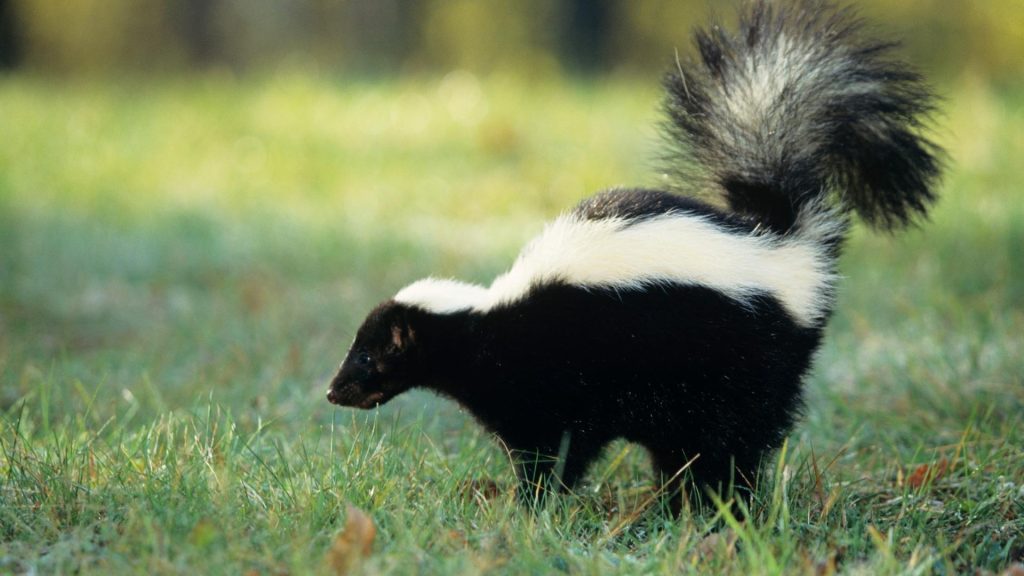
Yes, they do so because they need to refuel their bodies when the weather becomes warm. They also do it for the mating season which happens in February and March. Males are especially active in the spring. In fact, they are able to travel far just to find mates.
What Do Skunks Do in Spring?
First, they forage for food at night. They look for leftovers in places where pet food or bird feed is served. Luckily, they don’t damage landscapes. They only dig gardens and lawns to gather worms and other invertebrates for food.
When looking for invertebrates, their bodies rotate around their noses when digging for treats. The aftermath of the search is piles or rings of loose soil. Other signs that skunks have been to a certain place are:
- Small holes on flower beds
- Droppings that are a quarter or half-inch thick and one or two inches long; undigested insects can be seen on them
- Pilfered garbage bins
- A mild to strong skunk stench with a musty odor
Additionally, male skunks travel in search of female mates. In their quest, they sometimes fight with their competitors. During this period, many of them end up as roadkill on highways and roads.
Are Skunks More Active in Spring?
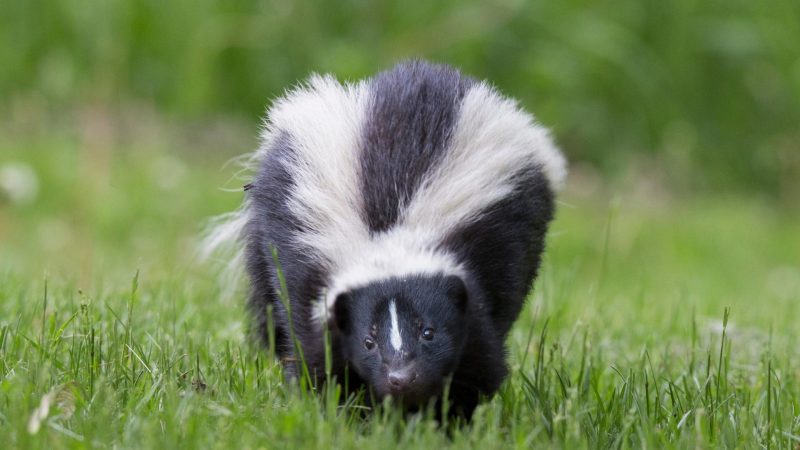
Skunks are more active in spring as they focus on foraging food to replace the big amount of calories that they lost in winter. It’s also the time for them to find a mate to produce offspring. They don’t hibernate in winter but only become dormant.
Skunks are in torpor from November to March since it depends on the needs and temperature. But they still occasionally wake up in winter. When in a torpor state, they don’t hibernate. It’s only their metabolism that slows down.
Related: Are Larder Beetles Active in the Spring? | Information and Facts
What Months Are Skunks Most Active?
Skunks are most active from February to mid-March since this period is their mating season. Once they feel the warm weather begin in February, they go out of their burrows and start looking for mates.
What Do Skunks Hate?
- Light. Since skunks are nocturnal, their eyes are sensitive to light. Hence, they don’t like bright lights or sensor floodlights.
- The smell of citrus fruits. Lemon or orange peels are natural repellents as animals, including skunks, don’t like their smell.
- . A rag soaked with ammonia is one of the things that bother skunks.
- A or soap with a strong scent. Ironically, skunks dislike a strong scent.
- Predator urine. Dog or coyote urine is one of the things that skunks hate.
- A mixture of and castor oil . Dilute this mixture in water, and you can use it to drive away skunks.
Why Do I Smell Skunk Every Night?
You can smell skunks every night not only because they’re nocturnal. Another reason is that the prime mating season has come. In this period, male skunks fight over the female. On the other hand, female skunks use their skunk spray to shoot the male that they don’t want to mate with.
Related: Skunk Smell Inside Your House at Night | What Does It Mean?
Are Skunks Bad to Have Around?
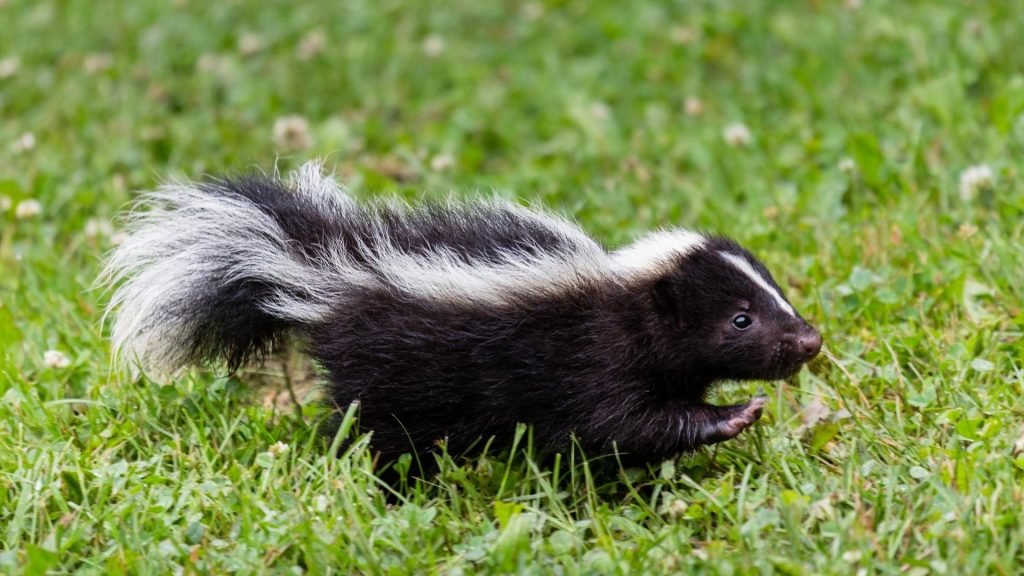
Skunks are bad to have around because their terrible smelling skunk sprays from their anal glands. Despite being solitary, mild-mannered, and not so aggressive, they can shoot the spray when they’re startled. Some people got sprayed when they were just walking in the dark and failed to notice a skunk.
Spraying is also their defense mechanism. When it seems that you make them feel threatened, turn your back when you see one so you can avoid getting stamped by their forefeet. It’s their first warning, and if you don’t back off, they will release their skunk spray.
Moreover, rabid skunks that were infected by raccoon rabies in the eastern parts of the US have become a public health concern since there may be a risk of transferring rabies to humans. Not to mention that there’s a lot of skunks in urban and suburban areas.
Related: How to Neutralize Skunk Odor | Tried and Effective
Are Skunks Friendly?
Yes, skunks are actually quite peaceful and are not known to be aggressive. They can be quite friendly when they’re born and raised under human supervision. They only spray if they feel threatened.
Where Do Skunks Nest?
Skunks nest in dens that they dig using their strong front claws. They usually make it in burrows deserted by coyotes, foxes, and squirrels. If dens are nowhere to be found, they settle for culverts, hollow logs, and brush piles.
In urban areas, skunks nest below porches, decks, and at the bottom of the building where they become a nuisance. If the ideal den is not available, the last option is to dig their own. Communal dens are prevalent in places with cold climates in winter.
What Attracts Skunk to Properties?
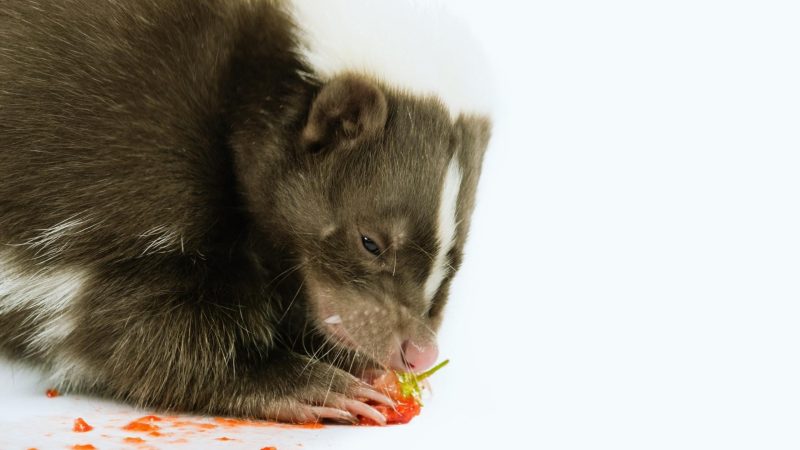
- Freshly Laid Garden Beds. Newly-made garden beds or fresh sods attract a skunk as they are filled with grubs, earthworms, and other soil insects.
- Food Supply. The hunt for food for skunks starts in spring, so they patrol properties at night. They can ravage the lower part of ripening crops while looking for grasshoppers, crickets, beetles, bees, and larvae. Moreover, they scavenge for pet food, fruits, nuts, birdseed, and more.
- Nesting Place. They can find suitable nesting places like under porches and decks as well as basements and crawl spaces. Since skunks don’t like to travel far, they don’t stay in properties for shelter but food supply and water as well.
Where Do Skunks Go During the Day?
Skunks go out during the day even though they’re known as nocturnal and hunt at night. They roam during the day for some reason.
- When the skunk’s natural habitat is disturbed, it won’t wait until it gets dark to search for a new one. It needs shelter to be protected from predators. It’s an emergency for them to find a den, so they go to a suitable area even if it’s daytime.
- Shortage of food obliges skunks to go out during the day in places that abound with food supply. This particularly happens in winter due to scarcity of food.
- An infected or sick skunk can go somewhere during the day as it’s slow and disoriented. It might lose track of its den and can’t find its way back. It’s a risky move for the skunk and humans too.
The skunk exposes itself to wild animals while it can transmit infectious diseases to a person if it’s rabid.
How Smart Are Skunks?
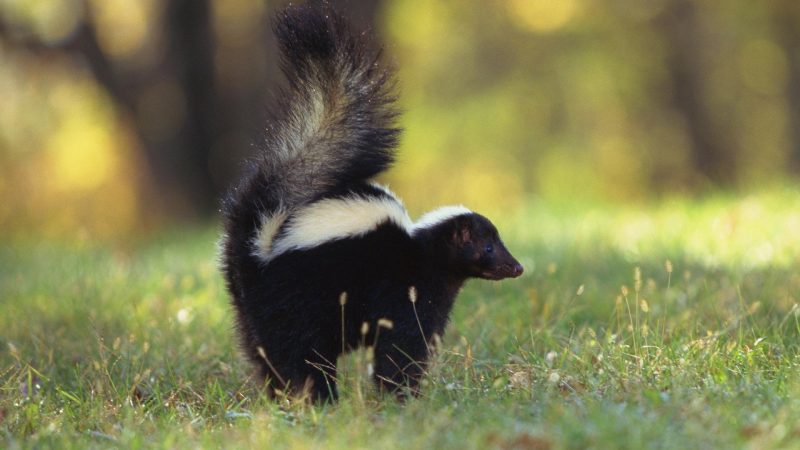
Skunks are smart, curious, and sensitive animals with a temperament that varies from one to another, much like the distinctive personalities that cats and dogs have.
Related: How to Get Rid of Skunks Without Killing Them? | A Complete Guide
List of Sources
Hamilton, W. (2018). Signs of Spring 5: Skunks!
Gibbons, W. (2017). Skunks are more active now.
Guerra, M. A., et al. (2003). Skunk and raccoon rabies in the eastern United States: temporal and spatial analysis.
University of New Hampshire. (2018). Skunks Active in February?
Voyle, G. (2016). Springtime animal damage in your landscape. Michigan State University.
- Bed Bug Surge 2025: How to Detect, Prevent, and Safely Eliminate Infestations in Top U.S. Cities - June 18, 2025
- Asian Needle Ants Invade US Homes: 2025 Guide to Identification, Risks, and Effective Control - June 11, 2025
- New World Screwworm Alert: How US Livestock Owners Can Prevent Outbreaks and Protect Herds [Summer 2025 Update] - June 8, 2025
